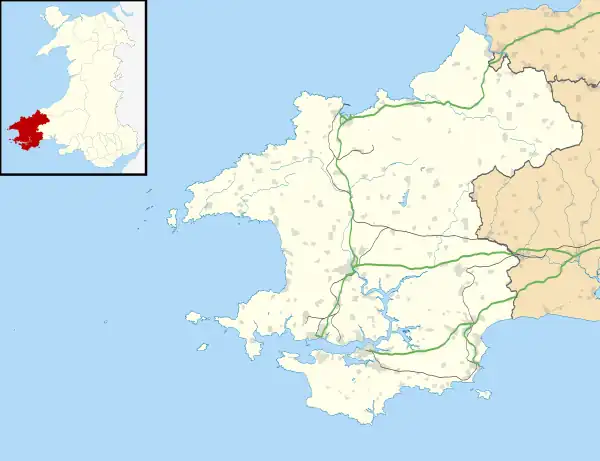| St Govan's Chapel | |
|---|---|
 | |
| Religion | |
| Affiliation | Christianity |
| Patron | St Govan |
| Location | |
| Location | St Govan's Head, Pembrokeshire, Wales |
 Shown within Pembrokeshire | |
| Geographic coordinates | 51°35′55″N 4°56′12″W / 51.5987°N 4.9368°W |
| Architecture | |
| Completed | 13th century |
Listed Building – Grade I | |
| Official name: St. Govan's Chapel | |
| Designated | 8 February 1996 |
| Reference no. | 17980[1] |

St Govan's Chapel is a chapel located at St Govan's Head, Pembrokeshire in south west Wales.
Built into the side of a limestone cliff, the building measures 20 by 12 feet (6.1 m × 3.7 m) with walls constructed from limestone, and consists of two chambers, one in the front and one in the back.[2] The majority of the chapel was built in the thirteenth century, although parts of it may date back further to the sixth century when Saint Govan, a monk moved into a cave located on the site of the chapel. One legend suggests that Saint Govan is buried underneath the chapel's altar, located at the east end of the building.[3] The entrance to the building is via a doorway on the north side, low stone benches run along the north and south walls and an empty bell-cote is located at the west end.[4] The slate roof is suspected to be a modern addition compared to the rest of the building.[4]
The building is accessible from the clifftop by climbing down a set of 52 steps,[5] although tourist organisations propagate the legend that when counted, the number of steps differs between going down and going back up.[6]
The building was listed with Grade I status on 8 February 1996. The chapel is within the Castlemartin Military Training Area and is sometimes inaccessible because of military activity.[7]
The chapel was used as a location in episode 1 of the third series of the BBC drama His Dark Materials.
Ogof Gofan
Under the chapel is a huge cave system, Ogof Gofan, containing a "cathedral-like structure", accessible only by abseiling down the cliff. The cave was re-discovered in 1966, but it had been used by people for thousands of years, from when the sea was miles from the cave mouth.[8]
References
- ↑ Cadw. "St. Govan's Chapel (Grade I) (17980)". National Historic Assets of Wales. Retrieved 15 May 2023.
- ↑ Britton, John; Brayley, Edward Wedlake (1815). The Beauties of England and Wales, or, Delineations, topographical, historical, and descriptive, of each county, Volume 18. p. 805.
- ↑ "St Govan's Chapel". Archived from the original on 28 September 2013.
- 1 2 "St Govan's Chapel (95059)". Coflein. RCAHMW.
- ↑ An Inventory of the Ancient Monuments of Wales and Monmouthshire: VII – Country of Pembroke. His Majesty's Stationery Office. 1925. p. 21.
- ↑ "St. Govan's Head – Walk 6" (PDF). Pembrokeshire Coast National Park.
- ↑ "Castlemartin firing notice February 2022". Ministry of Defence (United Kingdom). 2 March 2022. Archived from the original on 8 March 2022. Retrieved 18 December 2022.
- ↑ Owens, David (16 February 2019). "The hidden cave beneath one of Wales' most popular coastal walks". WalesOnline.